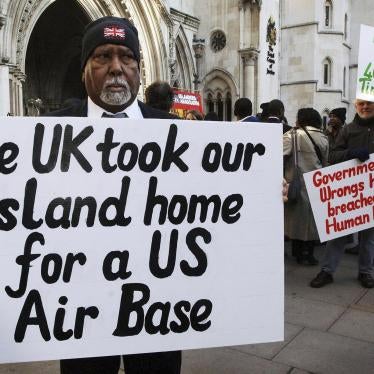UK troops who commit war crimes and crimes against humanity overseas, can still be prosecuted in UK courts.
In May the UK government reversed course on a plan that would have effectively immunized from prosecution UK forces who allegedly committed international crimes while serving overseas. This significant victory was brought about by nongovernmental organizations (NGOs,) including Human Rights Watch, which put pressure on the UK government to not include this provision in a new law, the Overseas Operations Act.
Despite this success, the new law remains problematic because it takes away the ability for many who suffered abuses by UK armed forces to sue for damages. This means that civil claims against UK forces relating to overseas operations can only be brought within 5 years of the alleged crime. The law also includes a “presumption against prosecution” for some crimes committed by UK forces more than 5 years ago.
Advocacy from NGOs such as Human Rights Watch and Freedom from Torture, prevented this presumption from applying to serious international crimes. An achievement all the more extraordinary considering that the bill initially passed with a very large majority in the House of Commons, the lower house of the UK government. However, the government changed its mind, when a large majority in the House of Lords voted against the bill.
One important element that changed parliamentarians' minds on this law is fear that, if these cases were not handled in UK courts, they could be investigated and prosecuted by the International Criminal Court (ICC) prosecutor instead. This point was repeatedly mentioned in parliament and led retired senior officers and high ranking civilian leaders to push for this change in the bill. Human Rights Watch’s Senior Legal Advisor was invited to give evidence to a parliamentary committee considering the bill and parliamentarians questioned him about this point.
Human Rights Watch has been key in promoting awareness of the ICC in the UK over the years, specifically as it relates to the ICC’s preliminary investigation into alleged war crimes committed in Iraq by UK troops. Although the ICC prosecutor closed the preliminary examination in December 2020, a decision Human Rights Watch criticized, the prosecutor’s office has expressed fears about the Overseas Operations Act. Human Rights Watch detailed some of those alleged crimes in a report, Pressure Point: The ICC’s Impact on National Justice, which had a chapter on the UK.
The amendment of the Overseas Operations Act shows the value of cooperation between Human Rights Watch and domestic civil society to highlight the international dimensions of problematic legislation. This is one small step towards justice for victims of serious international crimes.








